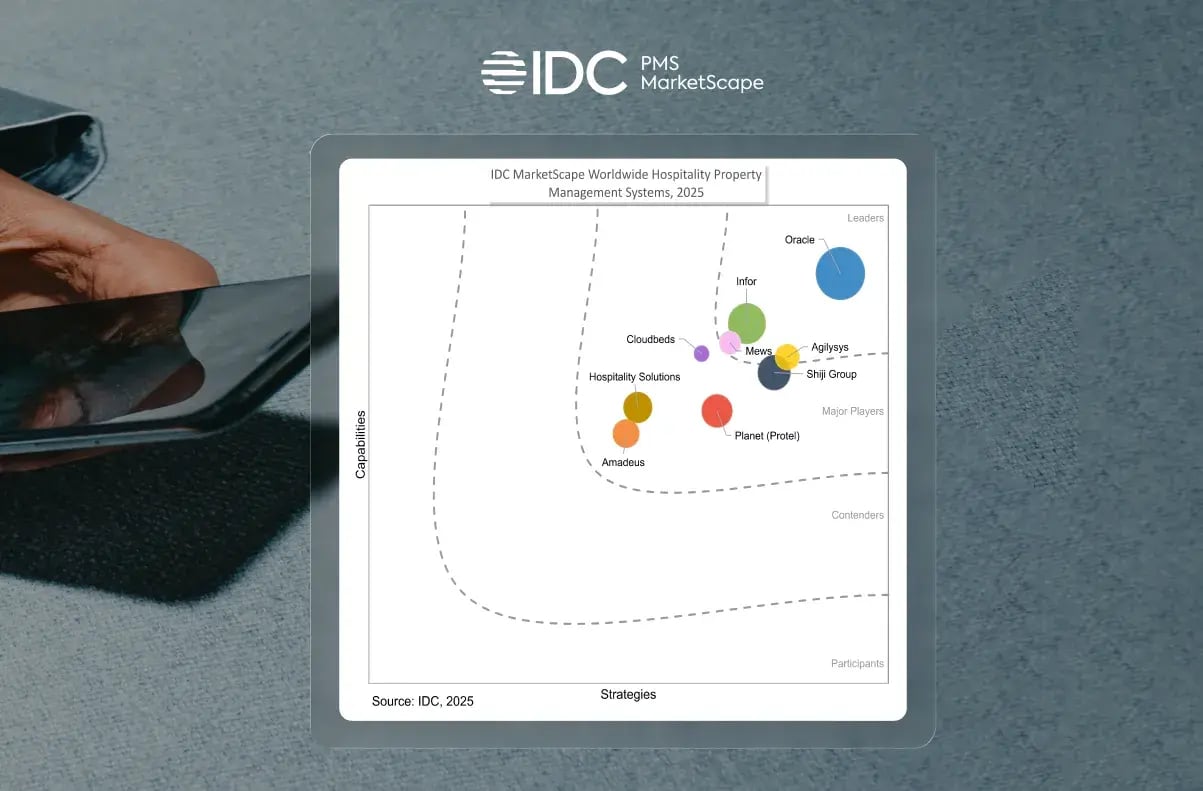The concept of IoT in hospitality continues to evolve and spread, allowing hotels to automate all aspects of their hotel services thanks to a network of connected devices. The internet of things unlocks the key to creating stellar guest experiences thanks to its ability to facilitate an integrated, customized and personalized journey with your hotel brand.
Whether it’s connected smart technology within the hotel room making guests feel special, smart thermostats to control energy costs and provide sustainable solutions, improved maintenance or increased safety with smart locks and facial recognition for entering the building or room, the IoT is without doubt the future of the hospitality industry. In this article we’ll take a look at what the iOT is, its benefits and uses in hospitality.
Table of contents
What does IoT stand for?
IoT stands for the Internet of Things, which refers to a network of devices connected to the internet in order to collect and transmit data, facilitate processes with the aim of providing better and more personalized service. Smart devices transmit data to and from the internet to create a customizable experience.
An IoT system is composed of three elements: smart devices, IoT applications and a user interface. Smart devices collect information from users or its environment and communicate this data over the internet to and from an application. This application then uses artificial intelligence to analyze data and make decisions, communicating back to the device to allow users to perform different functions.
How IoT can benefit the hospitality industry
The IoT is kicking up quite a storm, creating cross-sector business opportunities. Technology powering the IoT is already revolutionizing traditional industries including hospitality, where it heralds reduced costs for your property and an optimized guest experience thanks to a more customized and connected stay.
Tech-savvy hoteliers can harness valuable guest data (from sources such as marketing engagement, loyalty programmes, purchase histories) and glean actionable insights, using them to provide increasingly personalized reservations based on previous stay experiences and, ultimately, ramp up the guest’s “feel good” factor on each occasion.
8 uses of IoT in hospitality
Tech savvy millennials are the driving force behind the new digital customer values of today: authenticity, personalization, socio-emotional connection, convenience, control and speed.
When British technology pioneer Kevin Ashton first coined the term IoT back in 1999, magnetic-stripe room key cards were still de rigueur in hotels, the first Blackberry device was being introduced to the world, and Alexa was a popular baby girl name. So much has changed since; let’s take a look at what the IoT means for hospitality.
1. Smart mirrors
Smart mirrors that offer customized content and media on a touch-screen display can serve as a great way to customize the guest experience. You can personalize a greeting for your guests to make them feel welcome. They can check in on the weather, time, date, news updates or even get information on what to do in the city; it’s a fun and interactive way to use the IoT.
The smart mirror technology is already being used in the Marriott chain in their IoT Guestroom Lab, allowing guests to make all kinds of requests, from starting a yoga routine on a full-length mirror to asking for additional housekeeping.
Read more about smart rooms.
2. Daylight harvesting
Daylight harvesting is another interesting use of the IoT in your hotel. Sensors can adjust the LED indoor lighting based on the natural light coming in or the light available in a space. It’s a sustainable lighting design that allows hotels not only to save energy but it’s also a great guest room automation system that makes guests feel comfortable and allows them to adapt to natural light which is also great for jet lag.
3. Robots
Hotels can use the IoT to implement the use of robots as a way of automating processes where the human touch isn’t needed. For example, robotic lobby concierge can provide location-relevant information to guests. The futuristic Asian Henn-na Hotel is already doing it. It’s the world’s first hotel to be staffed by robots, and multilingual ones no less!
Next-generation features include android concierges, robotic porters (rechargeable luggage trolleys), a robotic cloak room attendant (a giant mechanical arm in a glass case), wardrobes that can remove odors and wrinkles from clothes and facial recognition door openers.
4. Voice technology
In 2018, Amazon launched Alexa for Hospitality, voice assistant technology which allows guests to access services and amenities from the comfort of their room using nothing more than vocal commands such as “Alexa, order room service!”. The system allows hoteliers to customize the features according to your brand and the specific needs of your guests, and also to measure guest engagement through analytics and reporting.
Learn more about Alexa for hospitality.
5. To meet or surpass modern expectations
You don’t need Mews to tell you that travelers’ expectations are changing. In the era of Airbnb, travelers want to interact with their hotel or hostel environment in the same way that they do at home, and they expect familiar comforts such as an automatic WiFi connection as soon as they walk through the door.
Take note: it’s essential that your property embraces the IoT, using cutting-edge services and connected devices to replicate the smart home experience, increase guest satisfaction by understanding their digital needs, and get ahead of the competition in what’s an increasingly crowded environment.
“Technological innovations are re-shaping the hotel industry. Those that embrace these changes will benefit from streamlined operations and better guest engagement. Those that don’t will find themselves left behind.”
Bert Greenstein, VP of IBM Watson, Internet of Things
6. On cruises
As you’d expect, the IoT goes beyond land-based hospitality. Princess Cruises are using complementary Ocean Medallion apps to get ahead of the game and transform cruise ships into smart cities. The interactive wearable medallions are not only a waterproof payment method, navigational tool and cabin key, they’re also capable of tracking passenger’s movements on the ship and learning their favorite wines and meals.
7. Product advancements to enhance the guest experience
As the advancements in connected devices in hospitality snowball, expect to see more product innovation (think user-friendly in-room tablets, beds that adjust firmness to guest preferences, personalizable digital wall art and virtual assistants), co-branding and bold partnerships with tech giants, as hoteliers and hosteliers strive to create the ultimate room experience of the future.
Scandinavian group First Hotels is the first chain in the world to offer rooms with customisable beds, in a dedicated “SmartBed” room category. Located in the quietest part of their hotels they feature spring beds with adjustable mattress firmness, and a sleep kit containing a mask and earplugs. Guest satisfaction is said to have shot up, proving that customizable beds create happier and more loyal guests.
8. Closing the gap between hotels and hostels
We can also expect to see the gap between hotels and hostels closing. A great example of this shift is CityHub in Amsterdam. Inspired by Japanese capsule hotels, it’s been designed to “combine the interactive community of a hostel and the privacy and comfort of a hotel”.
Branded as “an urban hotel for digital natives”, it targets connected generations with features such as RFID wristbands, mood lighting, personalizable music streaming systems, and a digital lobby. Their CityHub app also offers guests access to their own MiFi hotspot mobile route when out and about in the city.
Conclusion
Hospitality is intrinsically all about human connections, and the art of receiving and treating guests and strangers in a warm and generous manner. The challenge facing us today is how best to use the IoT to build smarter relationships with guests and create the ultimate experience that will allow a hotel brand to leave a lasting impression on guests to keep them coming back year after year.

2025 IDC MarketScape for Worldwide Hospitality PMS
Download now
Table of contents
Hospitality hot takes straight to your inbox



.webp)
